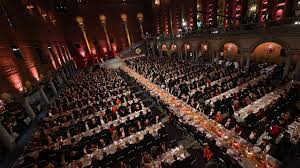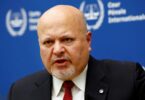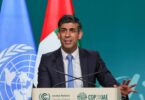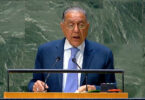Minsk (AFP): The Nobel Foundation’s decision to invite ambassadors from Russia and Belarus to this year’s Nobel award ceremony sparked anger on Friday in Ukraine, Sweden and among opponents of the Minsk regime.
Ukrainian foreign ministry spokesman Oleg Nikolenko wrote on Facebook that the Foundation should support efforts to isolate Russia and Belarus as “millions of Ukrainians suffer from an unprovoked war and the Russian regime is not punished for its crimes”.
The Nobel Foundation, which organises the annual Nobel prize ceremony and banquet in Stockholm, said on Thursday it would extend an invitation to all ambassadors of countries which have representation in Sweden or Norway to the “prize award ceremonies”.
In 2022, it decided not to invite the Russian and Belarusian ambassadors because of the war in Ukraine, and the Iranian envoy over the country’s crackdown on a wave of protests.
But this year it said it was returning to its previous practice of inviting all ambassadors.
Writing on X, formerly known as Twitter, the exiled leader of the Belarusian opposition, Svetlana Tikhanovskaya, called on the Nobel Foundation not to invite representatives of President Alexander Lukashenko’s “illegitimate regime to any events”.
She also demanded “the immediate release of Nobel Prize laureate Ales Bialiatski from prison”.
Swedish Prime Minister Ulf Kristersson said Friday he disagreed with the Foundation’s decision.
“The Nobel Foundation of course decides who they want to invite. But like many others, I was greatly surprised that Russia was being invited,” he said in a written statement to AFP.
“I would not have done it if I were handling invites to an award ceremony and I understand that it upsets many people in both Sweden and Ukraine,” Kristersson added.
Several prominent Swedish politicians, including the leaders of the Centre, Green, Left and Liberal parties, have said they would boycott the event over the Russian ambassador’s presence.
The Foundation has insisted its decision was taken with a view to improving dialogue and democracy. “It is clear that the world is increasingly divided into spheres, where dialogue between those with differing views is being reduced,” Vidar Helgesen, the executive director of the Nobel Foundation, said in a statement.
“To counter this tendency, we are now broadening our invitations to celebrate and understand the Nobel Prize and the importance of free science, free culture and free, peaceful societies.”
The glitzy bash is held each year in Stockholm on December 10 when laureates in the fields of medicine, physics, chemistry, literature and economics receive their awards from King Carl XVI Gustaf.
A separate ceremony is held in Oslo on the same day for the Peace Prize laureate.







